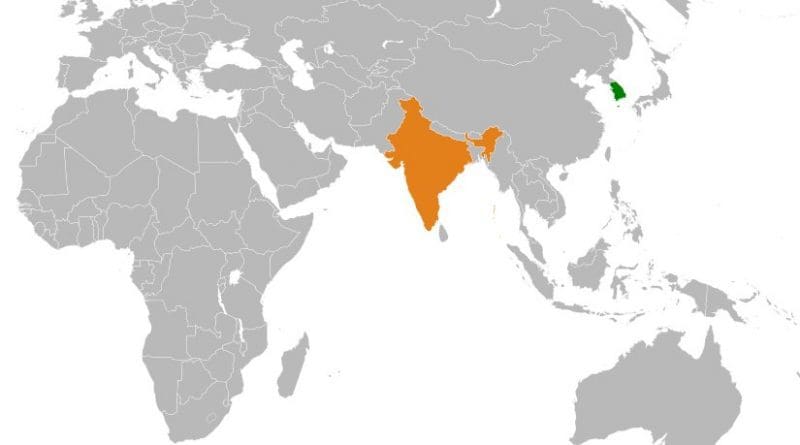India-ROK Nuclear Cooperation: Is It A Win-Win Situation? – Analysis
By IPCS
By Pranamita Baruah
The India-Republic of Korea (ROK) civil nuclear cooperation agreement was signed on 25 July during President Pratibha Patil’s visit to Seoul. Terming the agreement ‘historic’, ROK President Lee Myung Bak hoped that it would demonstrate the strong strategic partnership between the two countries.
Discussion on a civil nuclear cooperation agreement was initiated for the first time during Indian Foreign Minister SM Krishna’s visit to Seoul for the sixth India-Korea Joint Committee Meeting on 17-19 June 2010. At that time, both Krishna and his Korean counterpart, Yu Myung-hwan, agreed to launch negotiations on nuclear cooperation. Later, during their meeting on the sidelines of the ASEAN Summit in Hanoi in October 2010, Indian Prime Minister Manmohan Singh and President Lee emphasized the necessity to start talks on a civil nuclear deal. This accelerated the process considerably making possible the conclusion of the agreement within a year.
The agreement seems to put both India and Korea in a ‘win-win’ situation. Over the last few years, to ensure energy security, India has signed nuclear agreements with a number of countries, including the US, Russia, France, Canada and the UK. South Korea is the ninth country to join the list. The agreement would help the ROK in getting access to India’s civil nuclear energy infrastructure.
The ROK, with its twenty nuclear plants, currently generates 35 per cent of its electricity needs. It is keen to export its nuclear technology to fast developing countries like India. Seoul also aims to export as many as 80 nuclear reactors to various countries by 2030. The nuclear deal will provide the South Korean companies a framework to participate in the former’s ongoing nuclear expansion programme. India now has 20 power-generating nuclear reactors. It plans to build about 40 more by 2032. The agreement would facilitate South Korea to join countries like Russia, France and the US in these projects. In August 2009, the state-run Korea Electric Power Corporation (KEPCO) struck a MoU with Nuclear Power Corporation of India Ltd (NPCIL) for bilateral cooperation on technical exchange of data and experience. KEPCO has expressed interest in exporting to India its APR-1400 (Advanced Pressurized Water Reactor). The new deal would certainly make it smooth for KEPCO as well as other such Korean companies to enter the Indian market.
India will also benefit from the agreement, especially at a time when the much hyped India-Japan nuclear cooperation agreement is going through a rough phase. The Fukushima crisis and Tokyo’s decision to give up nuclear power altogether currently pose major challenges to the proposed Indo-Japanese nuclear deal. Over the last few years it has became difficult for a number of western countries to enter the Indian nuclear energy sector as Japan holds the licenses for critical components of these reactor designs. French nuclear firm Areva and General Electric Co of the US earlier agreed to sell nuclear reactors to India. However, they faced major hurdles without Japan’s support as Japan Steel Works produced reactor vessels used by both companies. Although in 2008, Japan, as part of the 46-nation Nuclear Suppliers group (NSG), agreed to grant a crucial waiver to India, Tokyo continued to avoid nuclear trade with India because the latter declined to join the NPT.
India’s ambitious plan to expand its nuclear power generation capacity to 63,000 megawatts by 2032 necessitates concluding agreements with uranium-rich and technologically advanced countries. South Korea currently is the world’s sixth largest nuclear exporter, including nuclear technology. The safety of Korea’s nuclear plants is very impressive and the IAEA has made highly positive evaluations of them. South Korea also proved its capability by competing with countries like France for a massive nuclear deal worth $20 billion in the UAE and winning it in December 2009. To India, The ROK would serve as a cheaper nuclear supplier and provide an alternative chain for nuclear reactors and components. The agreement of 25 July will also reinforce India’s demand to ratify the Convention for Supplementary Compensation (CSC).
The India-Korea nuclear agreement could also help New Delhi diplomatically. So far, India’s diplomatic relations with East Asian countries have been very limited. With the help of the deal, India could expand its civilian nuclear network in that region and subsequently conduct better nuclear diplomacy. Both India and Korea have the potential to emerge as the leaders of the next generation of nuclear energy. Democratic values shared by both the countries might help them in becoming role models in the field of civil nuclear cooperation. The recent deal could also be instrumental in bringing them closer in economic and strategic fields. Seoul’s willingness to share its nuclear expertise with India would certainly usher a new era in India-Korea relations.
Pranamita Baruah
Researcher, IDSA
email: [email protected]

